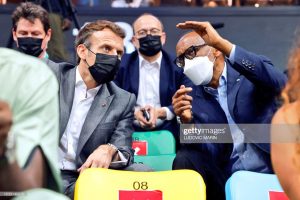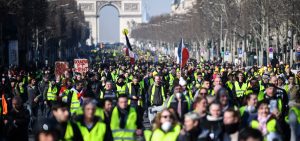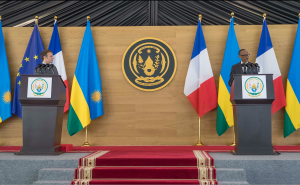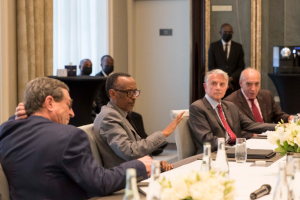 ‘And as we let our own light shine, we unconsciously give other people permission to do the same. As we are liberated from our own fear, our presence automatically liberates others.’ – Marianne Williamson, Our Greatest fear, in Return to Love: Reflections on the Principles of A Course in Miracles (1992)
‘And as we let our own light shine, we unconsciously give other people permission to do the same. As we are liberated from our own fear, our presence automatically liberates others.’ – Marianne Williamson, Our Greatest fear, in Return to Love: Reflections on the Principles of A Course in Miracles (1992)
When Emmanuel Macron defeated the French political oligarchy, he did it in most humiliating fashion. Picture a young, attractive maverick with no political alignment sending liberals and conservatives into an abrupt collective retirement, and replacing them with apolitical age-mates of various origins. His press-attaché and the face of the new French government became Sibeth Ndiaye, a black woman in her thirties from Dakar, Senegal, who’d received her French citizenship only a year before.
In a historically racist, macho gerontocracy, this was too fast, too far, as Macron would soon learn, at his expense. A year into his presidency, the French deep state sent farmers and factory workers from the hinterland to Paris to demonstrate en masse. The city was paralyzed for most of Macron’s presidency until the COVID outbreak and lockdown.

On a trip to Paris, I approached the ‘Gilets Jaunes’ – as demonstrators were being called based on their yellow high-visibility vests. Two protesters could not agree on one grievance – or any grievances at all. Macron! Was their grievance. He embodied progress, he embodied technology, he embodied migration and inclusiveness, he embodied the future; a future in which the French worker feared he would be made obsolete – and had the defeated politicians and the right wing ‘National Gathering’ to thank for breathing life into those unjustified fears.
With no common leader and undefined requests, it was impossible for Macron’s government to negotiate with Gilets Jaunes, who’s dedication to Saturday protests seemed not to wane. Western media presented their grievances as high-taxes and other social demands, but in truth Gilets Jaunes in France are no different from Trump’s supporters in the US or pro-Brexit in the UK; they are all protesting a chimeric ‘invasion’ of blacks, Islam and Chinese.
With little room for maneuver at home, Emmanuel Macron turned to Africa to revitalize his presidency, there too, everyone he visited told him to speak to Paul Kagame first. Macron knew then that making peace with Kagame’s Rwanda was the key to re-entering the continent. But he was hindered by a major stumbling block: The unresolved role of France in the genocide against the Tutsi.
So he commissioned a group of French historians to bring clarity on the question and pave the way to reconciliation. Rwanda had initiated a similar exercise earlier, hiring a reputed American law firm with the same mandate.
Upon the release of the ‘Muse’ and ‘Duclert’ reports, both establishing an ‘overwhelming responsibility of the French government and the French army in a foreseeable genocide’, French politicians and army generals named in the reports, feared prosecution. On their instigation, 20 of their retired colleagues signed a petition threatening a military coup in France. The missive claimed fears of shrinking ‘national honor’ and growing ‘public despair’, but in reality, French generals were sending a clear warning to Emmanuel Macron that he will not be winning a second term, should he reconcile with Rwanda and their nemesis Paul Kagame.
You see, by coming to Rwanda at this time, a year before the next presidential elections in France, Emmanuel Macron took a big risk, but it is the biggest gift he could offer to France, even if that should cost him his reelection. It is the same risk Angela Merkel took in 2008 when she allowed in a million Syrian refugees. She paid the price with a plummeting popularity and potentially her seat as German Chancellor, but the ageing German society was in need of a strong demographic boost of young, educated and motivated Caucasian ‘re’-population. Germans can’t see it now, but they’ll thank her one day.
With a strong grip on the European market and an ageing working class, Germany’s problem is population, while France’s biggest challenge is economic dynamism – and like everybody else they badly need Africa: the future biggest market. While the French ‘impressed’ Africans by selling them their way of life, their language, cuisine and other ‘trinkets’, Kagame toured the continent demystifying imported remedies, encouraging ‘home grown solutions’ and political pragmatism. Macron’s dilemma was to make peace with Rwanda or draw a line on the increasingly contested France’s presence in Africa…
Reputed fearless, uncompromising on principles and seasoned on fighting with the French and prevailing, Paul Kagame – Macron knew – could not be threatened, bribed or outmaneuvered.
He also knew what was required of him after the Duclert’s report, was to unequivocally admit the role of France in the genocide against the Tutsi, as established in the report and ask for forgiveness in Rwanda. But he was to do that without giving further ammunition to the French right wing and resentful ex-oligarchy both slowly regaining popularity in his country.
He failed on his first test: At the Genocide memorial!
After an emotional, poetic tribute to Tutsi victims, an outline of the overwhelming responsibility of France in the genocide against the Tutsi and a beautifully formulated implore of ‘the gift of forgiveness’ from genocide survivors, he added one paragraph too many, defending an obsolete narrative of a ‘deceived’ and ‘blindfolded’ France, unwittingly supporting a government of killers. Then he pronounced words that damaged his entire speech: ‘The French army did not dishonor itself, it was not complicit, and killers did not have the face of France’, he remarked.
Emmanuel Macron left a bad taste in the mouth of survivors from Bisesero who were abandoned by the French army, the women from Nyarushishi who were raped by French soldiers and relatives of victims of Murambi who’s fresh corpses, French soldiers hid from UN inspectors by playing volley-ball atop where they were buried.
But the story doesn’t end there…
 Marianne Williamson once wrote, ‘as we let our light shine, we automatically give permission for others to shine too…’
Marianne Williamson once wrote, ‘as we let our light shine, we automatically give permission for others to shine too…’
When the two presidents got at Village Urugwiro for a press conference, President Kagame didn’t criticize his French counterpart. Instead he praised his courage to stand up for the truth, no matter the cost. He reminded him that racism shouldn’t guide politics – or geopolitics, that it wasn’t excuses that Rwandans were looking for, but the truth, he reminded him that he could do it; listening to the speech, I was wondering where President Kagame was going with this…
When came Macron’s turn to speak, he pushed aside his written speech – no doubt brainstormed and crafted by top rhetorical geniuses over many nights in Paris – and became himself. The stiff and fearful politician of the Gisozi memorial, gave way to a now empowered and touched human being, speaking from the heart, with humility, at times lowering the voice to mark the gravity of the role of his country in the genocide against the Tutsi, at times to implore Rwandans to gift forgiveness to France. At Urugwiro, Macron didn’t dare bring back the demagoguery on an ‘innocent French army and a blinded French government’. The speech of his predecessor had empowered him to overcome his fears.
To his credit Macron seemed to wish to say more but was prevented by his political predicament, and in my view, his formula was right: instead of ‘I am sorry’ – which is an act of self-absolution, ‘I beg for your forgiveness’ petitions the injured party’s contribution and consent; a form that best meets Rwandan sensibility.
The secret of the pudding, is in the eating:
A colleague reminded me of a classic French number from the seventies, by the beautiful Dalida, going: ‘Paroles, paroles, paroles, encore des paroles….’, in all matters French, Rwandans are unfazed by experience. After the courageous speeches, the time now is for tangible actions – and we can count on Kagame to hold Macron to his word.
In concrete terms, this would mean a full divorce with genocide perpetrators harbored in France for the last 27 years and repression of genocide denial on its territory, to which Macron promised that France will accelerate efforts to bring them to justice.
To date, Rwanda has issued 47 indictments, out of which three suspects were tried, found guilty and convicted namely: former head of Rwandan intelligence Simbikangwa Pascal (24 years), former bourgoumesters Ngenzi Octavien and Barahira Tito, each convicted to life sentences. Most cases are still pending, including one targeting Agatha Kanziga Habyarimana, wife to late president Juvenal Habyarimana, believed to be one of the masterminds of the genocide against the Tutsi.
In June 2004, the European Court of Human Rights condemned France for its sloth in trying perpetrators of the genocide against the Tutsi living on its territory. There is a principle in international law of: ‘Aut dedere aut judicare’, Latin for ‘either extradite or prosecute’. However, extradition to Rwanda of Genocide fugitives living in France might prove hard to achieve. Unlike other countries in Europe – in Africa and America, France does not extradite genocide fugitives to Rwanda.
The prevailing jurisprudence of the French Court of Cassation (an equivalent of the Supreme Court in Rwanda) precludes extradition in Rwanda, in virtue of the principle of ‘non-retroactivity of more severe punitive laws’. French judges base their decision on the fact that by the time of the commission of the genocide against the Tutsi, Rwanda did not have laws repressing the crime of genocide.
This argument is so weak, that the French court never elaborates further, each time they are petitioned to hear matters of extradition. Nor has its judges cared to respond to the legal argument that Rwanda signed and ratified the Convention on the Prevention and Punishment of the Crime of Genocide of 1948, since April 1975; 19 years before the occurrence of the genocide against the Tutsi.
In law, once a country signs and ratifies an international convention, it becomes part and parcel of its legal arsenal. We therefore remain unanswered to date, but hopeful that one day, the French Court of Cassation might overturn its own jurisprudence and allow extradition of genocide fugitives to Rwanda.
In the event that it doesn’t, there is a second solution: France cannot ‘extradite’, but it can ‘expel’ genocidaires.
Indeed on asylum or citizenship application forms, one must typically answer the question: ‘Have you taken part in committing crimes against humanity’? This is the basis upon which, if revealed that a suspected genocidaires lied in his or her application, their naturalization can be revoked, then declared Persona Non Grata on French territory, or even in the European Union, then if they do not find a third country to host them within the given deadline, legally deported to Rwanda.
I kept the best for last…

After the twenty French generals had signed the petition threatening Macron of sedition, Paul Kagame knew this would give cold feet to the young president and affect his good intentions. That’s when he gave a mission to a visiting François Duclert, in Kigali to present the president with the findings of his report. He asked the French historian to contact retired French soldiers whom he had known in the past and the rare ones to have informed their hierarchy of the preparations of a genocide against the Tutsi in Rwanda; namely General Éric de Stabenrath, General Jean Varret, colonel René Galinié, and Yannick Gérard, former French ambassador to Uganda from 1990 to 1997.
When the president flew to Paris, officially for a summit on Sudan and funding Africa, his main mission was to mobilize ‘his’ French troupes too and reassure Macron and the French military. More than his new ‘friendship’ with Emmanuel Macron, Paul Kagame envisions positive relations between France and Rwanda, whether Macron is re-elected or not. And for that he wanted to make peace with himself as someone who was unjustly detained in France, and with the French army – the good ones, which as a former soldier himself, understands was only following orders.
Now the question remains, what other good offices shall president Kagame undertake, to bolster Macron’s chances of re-election in France? The answer, in eleven months….
Update: Emmanuel Macron was eventually re-elected with just under 60% of votes; A good score in France!















Appreciated the coverage. Your arguments are compelling. Well done Gatete!